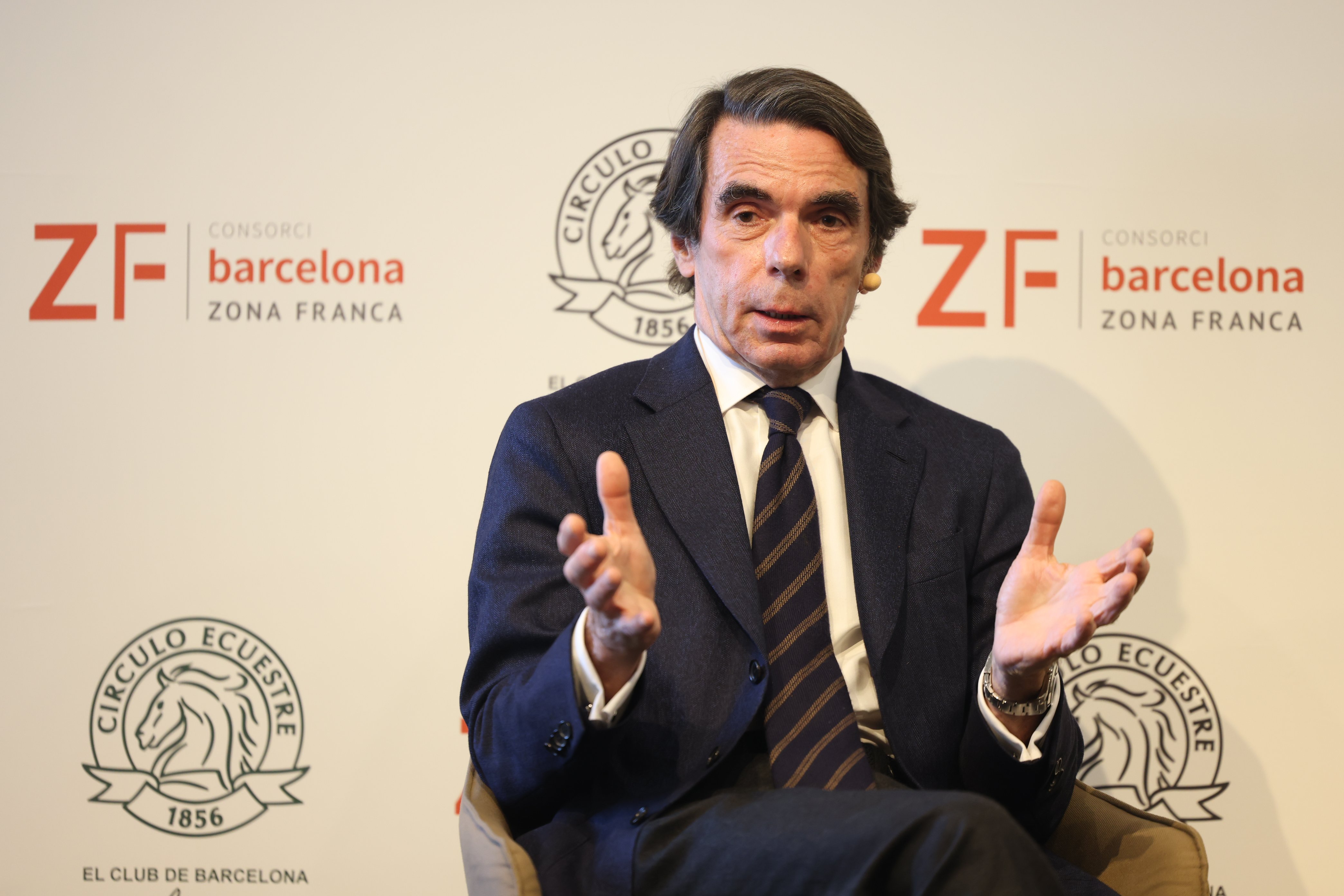To say that José María Aznar never leaves anyone indifferent is not an exaggeration. The former Spanish prime minister once again showed his teeth today, making his usual fierce criticism of the Catalan independence movement as well as the Spanish executive formed by Socialists and Unidas Podemos. At a conference entitled Intersecting Agendas Madrid-Barcelona held this afternoon at Barcelona's Círculo Ecuestre club, Aznar threw barbs on several Catalan issues - in particular, leaving no doubt over his position on the current debate on Catalan language immersion: "It's not a debate on how to protect Catalan, but about wanting to exterminate Spanish." In fact, he also considered this to be an impossible goal, because "Spanish cannot be exterminated, even if they insist on it".
He also spoke out strongly against the independence movement, whose situation he compared to a "melancholic stuck record". Regarding the possibility of finding a solution to the political conflict between Catalonia and the Spanish state, he affirmed that it is possible, although he is suspicious of the current Spanish government: "It is not being done, but there are possibilities". Aznar did not raise many options for this reunion between the two governments, given that the only guideline he put forward was that it must not go beyond the limits of the Spanish Constitution. "The law has no alternative," he said. "It is part of the solution, and if it is not implemented, there will be no solution."
In the same vein, the former Popular Party (PP) leader also referred to the Catalan political prisoners and exiled leaders arising from the referendum of October 1st, 2017. And as on other occasions, he did not miss the chance to comment on them directly. The day of the referendum, he said, was not "glorious" for the independence movement. "It was an unfortunate day for the interests of Catalonia and for its prestige, as well as for the prestige and interest of Spain." But as on other occasions, he did not even come close to condemning police violence: "Spain did what it had to do: comply with the law. Those convicted of sedition are those who broke the law."
There can be no Catalonia without Spain
Aznar went on with his criticisms of the Catalan independence forces. In fact, he accused the movement of being "based on unreality." "Sitting politically in unreality is a mistake. There is no self-government for Catalonia possible without Spain. There is no Europe is possible without Spain. The independence of Catalonia is not possible and will not be possible," he said. Instead, he urged the Catalan government to stop moving in its "impossible world", stating that when it has positioned itself in the field of the possible is when things have gone well for Catalonia.
A PP pact with Vox?
A hypothetical association of the PP and far-right Vox was also put on the table, but the former prime minister decided not to bite. He described Vox as a "right-wing" party, as opposed to the PP: a "constitutional party, absolutely European". And he did not propose that his former party should enter into an agreement with those of Santiago Abascal: "For Spain, I do not see any advantages in Madame Le Pen being in government," he said, drawing a simile between Vox and the main far-right party in France.
However, in one change from his usual habits, he refrained from mentioning the current leader of the PP, Pablo Casado. Aznar did not even mention Casado, one of his favourite targets, when he spoke about the recent elections in Castilla y León. On the result, he stressed that the PP became the most-voted party, commenting that the messages of some media "suggest that it is not clear who won". "Another thing altogether is that the result was not as was hoped, but the party did win," he said. However, he did not dwell on possible pacts, stating that it is up to the regional leader, Alfonso Fernández Mañueco, who will have to decide: "Whoever wins the elections must fight to govern."
More barbs for Sánchez
Aznar did not miss the chance to toss some invective in the direction of the current Spanish prime minister, Pedro Sánchez. For example, over the matter of Europe's NextGenerationEU funds, much awaited in Spain, the former PP leader commented that he would like to know how much money has arrived in Spain under this mechanism and what it is being applied to. "The situation bothers me because of the ignorance it generates and because I can't criticize it," he joked. He also said that it was the European Union financial aid that was responsible for the recently-approved lukewarm labour reform: "Brussels said that if the previous labour reform was scrapped, there would be no funds." The previous reform, which severely reduced rights of employees, was passed by a PP government.
But where he really put the boot in to to the Socialist PM was in reference to the crisis between Russia and Ukraine, as he recalled that the United States president, Joe Biden, has twice ignored Sánchez in his round of calls to European allies. "A few years ago you were at the table where decisions are made. But now you aren't, because you decided to leave," he said. The cause of Biden's disinterest in the Socialist leader, according to Aznar: his alliance with "communists, separatists and former terrorists."

